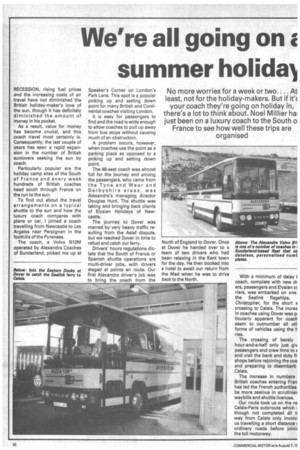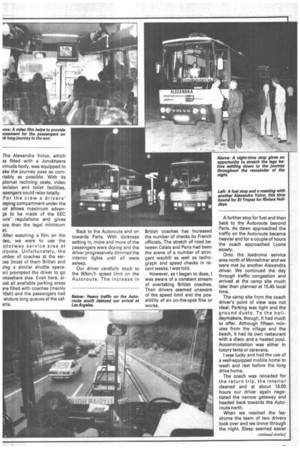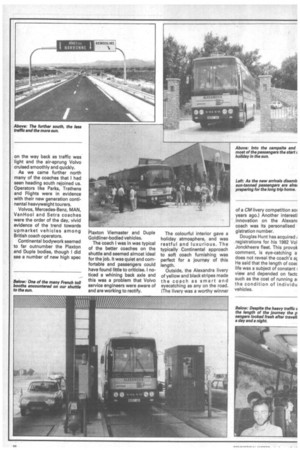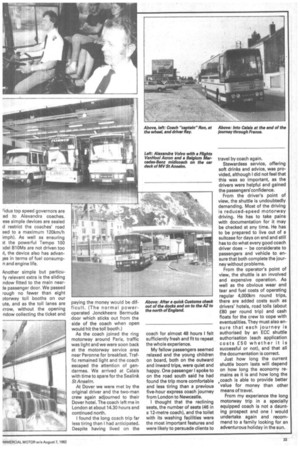We're all going on g summer holidal
Page 26

Page 27

Page 28

Page 29

If you've noticed an error in this article please click here to report it so we can fix it.
No more worries for a week or two.... At least, not for the holiday-makers. But if it's your coach they're going on holiday in, there's a lot to think about. Noel Millier ha just been on a luxury coach to the South o France to see how well these trips are organised
RECESSION, rising fuel prices and the increasing costs of air travel have not diminished the British holiday-maker's love of the sun, though it has definitely diminished the amount of money in his pocket.
As a result, value for money has become crucial, and this coach travel most certainly is, Consequently, the last couple of years has seen a rapid expansion in the number of British sunlovers seeking the sun by coach.
Particularly popular are the holiday camp sites of the South of France and every week hundreds of British coaches head south through France on the run to the sun.
To find out about the travel arrangements on a typical shuttle to the sun and how the luxury coach compares with plane or car, I joined a coach travelling from Newcastle to Les Argeles near Perpignan in the foothills of the Pyrenees.
The coach, a Volvo MOM operated by Alexandra Coaches of Sunderland, picked me up at Speaker's Corner on London's Park Lane. This spot is a popular picking up and setting down point for many British and Continental coaches visiting London.
It is easy for passengers to find and the road is wide enough to allow coaches to pull up away from bus stops without causing much of an obstruction.
A problem occurs, however, when coaches use the point as a parking place as opposed to a picking up and setting down point.
The 46-seat coach was almost full for the journey and among the passengers, who came from the Tyne and Wear and Derbyshire areas, was Alexandra's managing director Douglas Hunt. The shuttle was taking and bringing back clients of Elysian Holidays of Newcastle.
The journey to Dover was marred by very heavy traffic resulting from the Aslef dispute, but we reached Dover in time to refuel and catch our ferry.
Drivers' hours regulations dictate that the South of France or Spanish shuttle operations are multi-driver jobs, with drivers staged at points en route. Our first Alexandra driver's job was to bring the coach from the North of England to Dover. Once at Dover he handed over to a team of two drivers who had been relaxing in the Kent town for the day. He then booked into a hotel to await our return from the Med when he was to drive back to the North. With. a minimum of delay t coach, complete with new dr ers, passengers and Elysian cc riers, was embarked on one the Sealink flagships, Christopher, for the short $ crossing to Calais. The increa in coaches using Dover was p, ticularly apparent for coach seem to outnumber all ott forms of vehicles using the ft ries.
The crossing of barely hour-and-a-half only just giv passengers and crew time to e and visit the bank and duty fr shops before rejoining the coa and preparing to disembark Calais.
The increase in numbers British coaches entering Fran has led the French authorities be more zealous in scrutinisii waybills and shuttle licences.
Our route took us on the ne Calais-Paris autoroute which though not completed all tl way from Calais only involvi us travelling a short distance ( ordinary roads before joinit the toll motorway. The Alexandra Volvo, which fitted with a Jonckheere irmuda body, was equipped to ake the journey pass as cornrtably as possible. With its plomat reclining seats, video levision and toilet facilities, rssengers could relax totally. For the crew a drivers' )eping compartment under the or allows maximum advertge to be made of the EEC ■ urs' regulations and gives ore than the legal minimum St.
After watching a film on the :leo, we were to use the otorway service area at monne. Unfortunately, the umber of coaches at the serDes (most of them British and )ing a similar shuttle operam) prompted the driver to go ■ mewhere else. Even here, alost all available parking areas are filled with coaches (mainly itish) and the passengers had endure long queues at the cafaria. Back to the Autoroute and on towards Paris. With darkness setting in, mare and more of the passengers were dozing and the driver progressively dimmed the interior lights until all were asleep.
Our driver carefully stuck to the 90km/h speed limit on the Autoroute. The increase in British coaches has increased the number of checks by French officials. The stretch of road between Calais and Paris had been the scene of a number of stringent waybill as well as tachograph and speed checks in recent weeks, I was told.
However, as I began to doze, I was aware of a constant stream of overtaking British coaches. Their drivers seemed unaware of the speed limit and the possibility of an on-the-spot fine or worse. A further stop for fuel and then back to the Autoroute beyond Paris. As dawn approached the traffic on the Autoroute became heavier and for a couple of hours the coach approached Lyons slowly.
Onto the Isadrome service area north of Montelimar and we were met by another Alexandra driver. We continued the day through traffic congestion and arrived at the camp site much later than planned at 15.45 local time.
The camp site from the coach driver's point of view was not ideal. Parking was tight and the ground dusty. To the holidaymakers, though, it had much to offer. Although fifteen minutes from the village and the beach, it had its own restaurant with a disco and a heated pool. Accommodation was either in luxury tents or caravans.
I was lucky and had the use of a well-equipped mobile home to wash and rest before the long drive home.
The coach was reloaded for the return trip, the interior cleaned and at about 19.00 hours our driver again negotiated the narrow gateway and headed back towards the Autoroute north.
When we reached the Isedrome the team of two drivers took over and we drove through the night. Sleep seemed easier on the way back as traffic was light and the air-sprung Volvo cruised smoothly and quickly.
As we came further north many of the coaches that I had seen heading south rejoined us. Operators like Parks, Trathens and Flights were in evidence with their new generation continental heavyweight tourers.
Volvos, Mercedes-Benz, MAN, VanHool and Setra coaches were the order of the day, vivid evidence of the trend towards upmarket vehicles among British coach operators.
Continental bodywork seemed to far outnumber the Plaxton and Duple bodies, though I did see a number of new high spec Plaxton Viemaster and Duple Goldliner-bodied vehicles.
The coach I was in was typical of the better coaches on the shuttle and seemed almost ideal for the job. It was quiet and comfortable and passengers could have found little to criticise. I noticed a whining back axle and this was a problem that Volvo service engineers were aware of and are working to rectify. The colourful interior gave a holiday atmosphere, and was restful and luxurious. The typically Continental approach to soft coach furnishing was perfect for a journey of this length.
Outside, the Alexandra livery of yellow and black stripes made the coach as smart and eyecatching as any on the road. (The livery was a worthy winner of a CM livery competition so' years ago.) Another interesti innovation on the Alexanc coach was its personalised gistration number.
Douglas Hunt has acquired registrations for his 1982 Vol Jonckheere fleet. This provok comment, is eye-catching a does not reveal the coach's ac He said that the length of coac life was a subject of constant I view and depended on factc such as the cost of running al the condition of individu vehicles. :idus top speed governors are ed to Alexandra coaches. ese simple devices are sealed d restrict the coaches' road eed to a maximum 120km/h imph). As well as ensuring it the powerful Tempo 100 )del B10Ms are not driven too it, the device also has advan;es in terms of fuel consumpn and engine life.
4nother simple but particu-ly relevant extra is the sliding ndow fitted to the main nearle passenger door. We passed rough no fewer than eight Dtorway toll booths on our ute, and as the toll lanes are Irrow, without the opening ndow collecting the ticket and
paying the money would be difficult. (The normal poweroperated Jonckheere Bermuda door which sticks out from the side of the coach when open would hit the toll booth.) As the coach joined the ring motorway around Paris, traffic was light and we were soon back at the motorway service area near Peronne for breakfast. Traffic remained light and the coach escaped the attention of gendarmes. We arrived at Calais with time to spare for the Sealink St Anselm.
At Dover we were met by the original driver and the two-man crew again adjourned to their Dover hotel. The coach left me in London at about 14.30 hours and continued north.
I found the long coach trip far less tiring than I had anticipated. Despite having lived on the coach for almost 48 hours I felt sufficiently fresh and fit to repeat the whole experience.
My fellow passengers seemed relaxed and the young children on board, both on the outward and inward trips, were quiet and happy. One passenger I spoke to on the road south said he had found the trip more comfortable and less tiring than a previous five-hour express coach journey from London to Newcastle.
I thought that the reclining seats, the number of seats (46 in a 12-metre coach), and the toilet with its washing facilities were the most important features and were likely to persuade clients to travel by coach again.
Stewardess service, offering soft drinks and advice, was provided, although I did not feel that this was so important, as the drivers were helpful and gained the passengers'confidence.
From the driver's point of view, the shuttle is undoubtedly demanding. Most of the driving is reduced-speed motorway driving. He has to take pains with documentation for it may be checked at any time. He has to be prepared to live out of a suitcase for days on end and still has to do what every good coach driver does — be considerate to passengers and vehicle to ensure that both complete the journey without problems.
From the operator's point of view, the shuttle is an involved and expensive operation. As well as the obvious wear and tear and fuel costs of operating regular 4,000km round trips, there are added costs such as drivers' hotels, road tolls (about 030 per round trip) and cash floats for the crew to cope with eventualities. They roust also ensure that each journey is authorised by an ECC shuttle authorisation (each application costs £50 whether it is successful or not), and that all the documentation is correct.
Just how long the current shuttle boom lasts will depend on how long the economy remains as it is and how long the coach is able to provide better value for money than other means of travel.
From my experience the long motorway trip in a specially equipped coach is not a daunting prospect and one I would undertake again and recommend to a family looking for an adventurous holiday in the sun.






















































